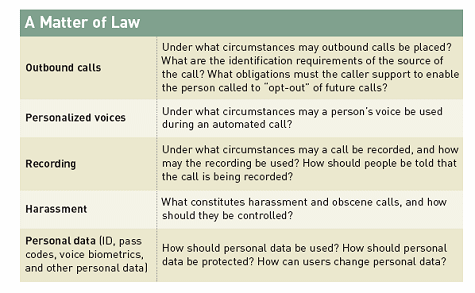Legal Issues Surrounding Speech
You sit down for dinner when the phone rings. You pick up the receiver and hear: This is an automated phone call from the Nonprofit Charity for the Preservation of Purple Squid….
Having no interest in protecting purple squid, you hang up. A few minutes later, the phone rings again. It’s a recorded message from the committee to re-elect your local politician. I need your support in the next election….
You hang up. The phone rings again. This time the call is a survey about the future of purple squid. Still having no interest in purple squid, you hang up.
All of these calls are permitted by the current federal no-call legislation, but many people find these calls annoying. Irritating phone calls are just one of several issues facing the speech technology industry. In fact, several issues affect and concern the speech technology industry. Many of these concerns are listed in the box below.
In the past, many industries failed to set their own guidelines and regulations, so government agencies stepped in and forced regulations on them, sometimes with overly restrictive and often surprising consequences. The housing industry faces a maze of complex housing codes. The healthcare industry is restricted by HIPAA guidelines. Some government regulations, such as banning the use of handheld phones while driving, are affecting speech technology providers.

Would it be a good idea for the speech technology industry to establish its own rules and guidelines? After all, who knows the speech industry better than we do? If we establish our own guidelines, we may postpone government regulation or make government-enforced restrictions unnecessary. If the government ever thinks the speech technology industry needs to have rules and regulations, then let’s have some well-thought-out rules and guidelines that the government can use.
So who in the speech technology industry is setting general guidelines and protocols for managing these issues? Or will we leave some government body to dictate the rules? The big question then becomes what we believe should be done to establish guidelines for the use of speech technologies in the marketplace.
Individual speech technology companies probably don’t have enough clout to have their homegrown guidelines adopted widely. Paul English’s GetHuman Standard (www.gethuman.com/standard) identifies 10 guidelines for IVR systems, but the speech industry has not fully embraced these guidelines. None of the three major speech technology organizations—the VoiceXML Forum, the World Wide Web Consortium’s Voice Browser Working Group, or the Advanced Voice Input/Output Society (AVIOS)—are setting guidelines for how speech technologies should be used.
This lack of action puts the speech industry at the mercy of government bureaucrats and related political processes, which often produce guidelines that don’t solve the problems and sometimes have unexpected side effects. So who will start the process of defining guidelines to promote the appropriate use of speech technology in the marketplace using a reasoned methodology with general consensus?
Jim Larson, Ph.D., is a speech application consultant, co-chair of the World Wide Web Consortium’s Voice Browser Working Group, and program chair of SpeechTEK Europe 2010. He can be reached at jim@larson-tech.com.